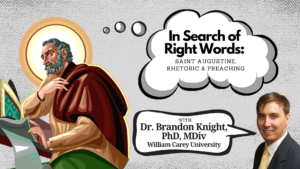 Column Title: In Search of Right Words: Saint Augustine, Rhetoric, and Preaching
Column Title: In Search of Right Words: Saint Augustine, Rhetoric, and Preaching
By Brandon Knight, Ph.D.
William Carey University
June column entry: “Wading into Scripture”
Column Description here: Saint Augustine, Bishop of Hippo, in his work On Christian Doctrine, illustrates the important relationship between preaching and rhetoric. Even in his day, many questioned what use the church could possibly gain from the study of oratory. Nevertheless, Augustine saw something much deeper in communication that many Christians still miss centuries later. This column will be a personal journey through Augustine’s On Christian Doctrine, through which he shows how God can, in fact, use rhetoric to help us see more clearly the beauty of scripture as well as find the right words when articulating gospel truths to others.
June 2022 / April-May 2022 / February 2022 / January 2022 / December 2021
Wading Into Scripture
I have always been interested why most people—myself included—immediately move to the more complicated topics of the Christian faith rather than beginning where we should—the fundamentals.
Early in my childhood, I remember being utterly enthralled when the book of Revelation was brought up even in informal discussions. And, despite my lack of religiosity at the time, I was hooked to the discussion as the writer, John of Patmos, portrayed his vision in beautiful imagery and archaic symbols that seemed mostly obscure at the time. That is, until one of my confident peers tried to interpret the Y2K event as the approaching apocalypse.
Sadly, in hindsight, these conversations never seemed edifying. Simply put, I was attempting to swim in deep waters without wisely preparing in more shallow territory.
St. Augustine, fourth century Bishop of Hippo, in Book II of On Christian Doctrine moves his readers to question their maturity in relation to Scripture. Augustine encourages Christian communicators to start with the fundamentals because understanding is the pedagogical key to sharing truth with others.
He begins by noting the importance of knowing the actual books of the Bible and their contents. Many of us—including myself—look back at church classes like Bible drill without fully appreciating the gift of knowing and memorizing Scripture. But how would we know where to find 2 James in the New Testament without it? Well, hopefully, you realize there is no 2 James in the biblical canon. More importantly than knowing the order of the canon, we should seek to understand their contents. We seem to miss the major importance of the fundamentals in the Christian faith despite their deep roots spanning over two millennia.
Beyond knowing the canon of Scripture, Augustine argues that believers should begin with reading and retaining its teaching in our memory.
Only after “familiarizing ourselves with Scripture” should we move to deeper waters.[1] In other words, we must look to the content that is most straightforward in its meaning. Like Paul argues, immature believers first need milk (Heb. 5:13).
By first learning the fundamentals, then we are rightly encouraged to progress to those more mysterious texts because we have become familiar with the language of Scripture.
In essence, Augustine argues that this is the process of Christian maturity. To know and understand in greater depth the glory of Christ enables one to communicate it to others.
Understanding Scripture from the Language of Scripture
A principle I learned in Seminary and that I continue to teach is that we must read and teach Scripture through the language of Scripture. Augustine makes a similar case.
For example, the bishop contends that one should never construct doctrine from an obscure passage but rather should bring complex passages into harmony with those that already offer plainer meaning. This is best noted in the discussion surrounding the possible loss of one’s salvation. Many make the mistake of beginning with the more obscure passage (Hebrews 6:4-6) rather than beginning with passages that are clearer (John 5:24).
The Bible itself is an intricate text of many authors that harmonize especially as they refer to previous voices. The picture below illustrates the overlap of voices and references within Scripture (over 63,000 internal references).[2]
In a remark, one public figure recently referred to this amazing infographic of intertextual references as ancient hyperlinks.
So, what does this mean for us?
Ultimately, if we do not acquaint ourselves with what Scripture says holistically, we will never fully attain clarity. Biblical teachers and pastors would be wise to always reconnect passages to their earlier referent to give the full meaning.
In this same section, Augustine argues that the Christian communicator can also be aided in interpretation by studying outside of Scripture.
Consider all the items referenced in Scripture. Everything from animals to plants. How much do you know of hyssop, for instance? Like me, probably not much. So, what exactly does Scripture mean when the psalmist requests that God, “Purge me with hyssop, and I shall be clean”?
Numbers—sadly—are also of importance for interpretation. What is the importance of the number 40? The Israelites were in the wilderness for 40 years. Jesus was tempted in the wilderness for 40 days and nights. Any connection? Jesus’s temptation in the wilderness mimics that of the Israelites. Whereas the Israelites failed numerous times through temptation, Jesus perfectly refrains from the temptation. In essence, he remained faithful where they were faithless.
What I am hopefully making clear is the need to know and understand Scripture through its own language and symbolism. In doing so, we can break through obscurity and see more clearly and intimately the beauty of God in Christ Jesus. In turn, we can share that beauty and clarity with others, but only after we ourselves gain understanding.
In thinking back to those earlier conversations about the book of Revelation, Augustine has helped me see a purpose to the mystery. The desire to read and discuss the more complicated topics of Scripture does have a particular purpose.
Our desire to unveil the obscurities of Scripture is God-given so that we might be motivated to start in the shallow end so that in due time we can swim in the deep end.[3]
Swimming in the deep end is enticing but dangerous. Let’s start correctly by wading into the shallow end both for our own understanding and for those with whom we communicate.
Notes
[1] Saint Augustine, “On Christian Doctrine, in Four Books,” Grand Rapids, MI: Christian Classics Ethereal Library, n.d., 107 pages, 29.
[2] “Bible Cross-References [Infographic],” ChurchMag (blog), September 16, 2013, https://churchm.ag/bible-cross-references/.
[3] Augustine, 27. “For those who seek but do not find suffer from hunger. Those, again, who do not seek at all because they have what they require just beside them often grow languid from satiety. Now weakness from either of these causes is to be avoided. Accordingly, the Holy Spirit has, with admirable wisdom and care for our welfare, so arranged the Holy Scriptures as by the plainer passages to satisfy our hunger, and by the more obscure to stimulate our appetite. For almost nothing is dug out of those obscure passages which may not be found set forth in the plainest language elsewhere.”

